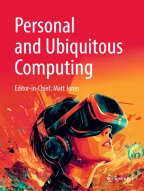Abstract
In smart environments, pervasive computing contributes in improving daily life activities for dependent people by providing personalized services. Nevertheless, those environments do not guarantee a satisfactory level for protecting the user privacy and ensuring the trust between communicating entities. In this study, we propose a trust evaluation model based on user past and present behavior. This model is associated with a lightweight authentication key agreement protocol (Elliptic Curve-based Simple Authentication Key Agreement). The aim is to enable the communicating entities to establish a level of trust and then succeed in a mutual authentication using a scheme suitable for low-resource devices in smart environments. An innovation in our trust model is that it uses an accurate approach to calculate trust in different situations and includes a human-based feature for trust feedback, which is user rating. Finally, we tested and implemented our scheme on Android mobile phones in a smart environment dedicated for handicapped people.
Similar content being viewed by others
References
Langheinrich M (2001) Privacy by design-principles of privacy-aware ubiquitous systems. In: Proceeding of the 3rd international conference on ubiquitous computing (UbiComp 2001), Springer LNCS 2201. pp 273–291
Stajano F (2002) Security for ubiquitous computing. Halsted Press, New York
Modahl M, Agarwalla B, Saponas TS, Abowd G, Ramachandran U (2006) UbiqStack: a taxonomy for a ubiquitous computing software stack. Personal Ubiquitous Comput J 10(1):21–27
English C, Terzis S, Nixon P (2005) Towards self-protecting ubiquitous systems: monitoring trust-based interactions. Personal Ubiquitous Comput J 10(1):50–54
Yin S, Ray I (2006) A trust model for pervasive computing environments. In: International conference on collaborative computing: networking, applications and worksharing
Taherian M, Jalili R, Amini M (2008) PTO: a trust ontology for pervasive environments. In: 22nd international conference on advanced information networking and applications—workshops, IEEE
Cheng HS, Zhang D, Tan JG (2005) Protection of privacy in pervasive computing environments. In: Proceedings of the international conference on information technology: coding and computing (ITCC’05)
Campbell R, Al-Muhtadi J (2002) Towards security and privacy for pervasive computing. In: Proceedings of ISSS, Tokyo, Japan, 2002, pp 1–15
Tentori M, Favela J (2005) Supporting quality of privacy (QOP) in pervasive computing. In: Proceeding of the sixth Mexican international conference on computer science. ACM Press, pp 58–67
Mihaela I, Andrea D, Hristo K, Luigi T (2007) A peer-to-peer multidimensional trust model for digital ecosystems. Computer Science Department, University of Malaga, Spain
Sun YL, Yu W, Han Z, Liu KJR (2004) Information theoretic framework of trust modeling and evaluation for ad hoc networks
Ren Y , Boukerche A (2008) Modeling and managing the trust for wireless and mobile ad hoc networks. In: ICC 2008 proceedings
Luo J, Liu X, Fan M (2009) A trust model based on fuzzy recommendation for mobile ad-hoc networks. Comput Netw 53:2396–2407
Masthoff J (2007) Computationally modelling trust: an exploration. University of Aberdeen, Aberdeen, Scotland, UK
Felix Gomez M, Martinez Perez G (2009) Security threats scenarios in trust and reputation models for distributed systems. Comput Security 28:545–556
Abi-Char P, Mhamed A., El Hassan B (2007) A fast and secure elliptic curve based authenticated key agreement protocol for low power mobile communications. In: The international conference on next generation mobile applications, services and technologies (NGMAST 2007)
Moloney M, Weber S (2005) A context-aware trust-based security system for ad hoc networks. In: Workshop of the 1st international conference on security and privacy for emerging areas in communication networks, 2005
Surie A, Perrig A, Farber David J (2007) Rapid trust establishment for pervasive personal computing. IEEE Pervasive Comput 6(4):24–30
Lagesse B, Kumar M, Paluska JM, Wright M (2009) DTT: a distributed trust toolkit for pervasive systems. In: IEEE conferences, 2009
Ahamed SI, Sharmin M, Ahmed S (2008) A risk-aware trust based secure resource discovery (RTSRD) model for pervasive computing. In: Sixth annual IEEE international conference on pervasive computing and communications. IEEE, 2008
Ghorbel M, Mhamed A, Mokhtari M (2009) Secured and trusted service provision in pervasive environment. In: IEEE international conference on wireless and mobile computing, networking and communications, 2009
Godoy D , Amandi A (2011) Enabling topic-level trust for collaborative information sharing. Personal Ubiquitous Comput J, OnlineFirst, 6 Aug 2011
El Husseini A, Mhamed A, El Hassan B, Mokhtari M (2011) A novel trust-based authentication scheme for low-resource devices in smart environments. In: The second international conference on ambient systems, networks and technologies (ANT-2011)
Borzymek P, Sydow M, Wierzbicki A (2009) Enriching trust prediction model in social network with user rating similarity. In: International conference on computational aspects of social networks, 2009. CASON ’09, pp 40–47
Yamasaki S (2011) A trust rating method for information providers over the social web service: a pragmatic protocol for trust among information explorers and information providers. In: 11th international symposium on applications and the internet (SAINT), 2011 IEEE/IPSJ, pp 578–582
Author information
Authors and Affiliations
Corresponding author
Rights and permissions
About this article
Cite this article
El Husseini, A., M’Hamed, A., El Hassan, B. et al. Trust-based authentication scheme with user rating for low-resource devices in smart environments. Pers Ubiquit Comput 17, 1013–1023 (2013). https://doi.org/10.1007/s00779-012-0548-8
Received:
Accepted:
Published:
Issue Date:
DOI: https://doi.org/10.1007/s00779-012-0548-8
